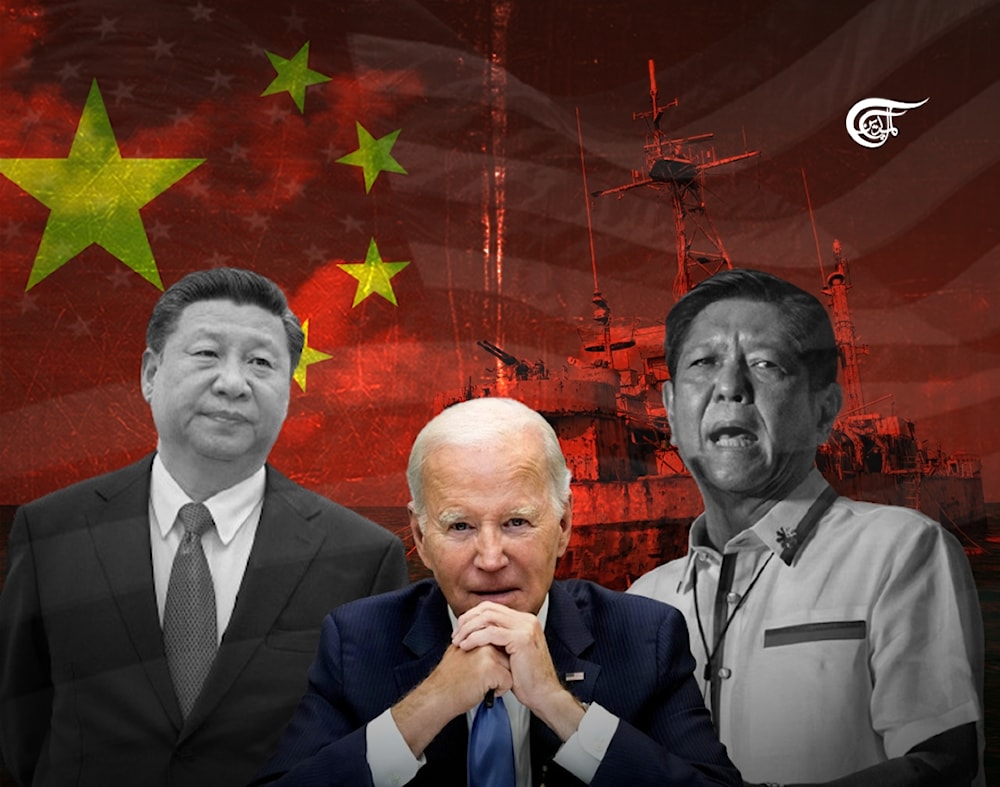Why Philippines' current approach to South China Sea is risky
There is no reason why maritime disputes in the South China Sea, which are just one aspect of the ties between China and the Philippines, should hijack bilateral relations.
-

For China, the vessel’s 1999 grounding was in and of itself illegitimate. Manila told Beijing back then that the grounding was accidental, promising to tow the ship away. (Al Mayadeen English; Illustrated by Batoul Chamas)
During Philippine President Ferdinand Marcos Jr’s visit to China in January 2023, Manila and Beijing agreed to properly manage maritime differences. It looked at the time that trust building, as had been the case since 2016, would continue to be on the right trajectory. With that in mind, it is extremely unfortunate that 2023 has seen increased tensions between the two sides over the South China Sea, as the Marcos Jr administration moved to distance itself from the good legacy of former Philippine President Rodrigo Duterte.
At the center of the current tensions is Ren'ai Jiao, a disputed submerged reef where the Philippines deliberately grounded a navy vessel in 1999 in an attempt to advance its territorial claim. In the Duterte era, this matter was managed well, with Chinese coastguard mostly allowing the Philippines’ resupplies to the ship. Under Marcos Jr, however, the Philippine government has ratcheted up rhetoric portraying China as a bully, and its strategy of feeding information on every sea encounter to media is certainly a manifestation of an intent to publicly put pressure on Beijing.
From Beijing’s viewpoint, it’s a far-fetched claim that China is bullying the Philippines on the Ren’ai Jiao issue. To China, the vessel’s 1999 grounding was in and of itself illegitimate, but China allowed resupplies of food and water for humanitarian reasons. Manila told Beijing back then that the grounding was accidental, promising to tow the ship away.
The fact that there was such a promise is confirmed not only by China’s Foreign Ministry, but also by non-Chinese sources. In a November 1999 press conference, then-Philippine Defense Secretary Orlando Mercado was quoted as saying that he assured Beijing that “…….efforts will be made to immediately extricate the vessels from the shoal”. Gregory Poling, director of the Southeast Asia program at the Center for Strategic and International Studies in Washington, revealed in a 2022 book that “when the Chinese government demanded that the ship be removed, President Estrada (then Philippine leader Joseph Estrada), feigning ignorance, promised to tow the vessel away as soon as it could be safely floated off the reef.”
Over the years, Beijing has repeatedly made diplomatic representations for Manila to honor its promise, only to hear some Philippine officials openly deny in 2023 that there was such promise. The Philippine side is even reportedly engaged in construction on the vessel by shipping materials such as cement and scaffolding. So, China’s tighter scrutiny of the resupplies to the ship is not bullying the Philippines. Instead, it is a response to Manila reneging on its promise after more than two decades of patience on China’s part.
In China’s perception, it’s somewhat difficult to fathom why Manila has shifted to a confrontational approach in the South China Sea. No one needs a reminder that Marcos Jr brought home $22.8 billion worth of bilateral investment pledges and 14 agreements on tourism, trade, and other initiatives after holding talks with Xi Jinping in Beijing in early 2023. It’s understandable if the Philippines hopes to seek a delicate balancing act between the US and China, but that is by no means the case in the current scenario.
Against the backdrop of Manila’s hardline stance on the South China Sea, Washington is increasingly voicing support to Manila by reminding China of the US-Philippine mutual defense treaty. The Philippines has also expanded US access to its military bases close to Taiwan, with Philippine officials acknowledging in private that the bases would become the staging ground for any conflict over Taiwan. Aligning with the US on the Taiwan question, in particular, is a dangerous provocation of China.
Sovereign countries have a shared love for independence. Many Filipinos are reportedly antipathetic to a narrative that describes their country as a tool in a US geopolitical game to contain China. However, the fact that the Philippines is a treaty ally of the US means that any friction between Manila and Beijing could be easily taken advantage of by Washington to serve US strategic goals. Frankly, this is the reality the Philippines is living with.
According to a survey released in June 2023 by the New York-based Eurasia Group Foundation, over 80% of the Philippine respondents were worried that US-China tensions could imperil their country's national security. So, a responsible Philippine government is supposed to think about how to help facilitate dialogue between Washington and Beijing, which is possible if Manila maintains good relations with both sides. On the contrary, if the Philippines is obsessed with its own disputes with China, it will inevitably manufacture yet another point of contention between the US and China. In return, that is detrimental to the Philippines’ national interests.
There is no reason why maritime disputes, which are just one aspect of the ties between China and the Philippines, should hijack bilateral relations. This is a point Marcos Jr made in person during his China trip. China has been the Philippines’ top trading partner for several years in a row. Chinese investors poured some $2.9 billion into the Philippines between 2016 and 2021. Tropical fruits from the Philippines enjoy an exploding consumer base in China. In recent years, the Association of Southeast Asian Nations has overtaken the US and the EU to become China’s biggest trading partner. This shift in China’s foreign trade landscape indicates a great deal of opportunities for countries such as the Philippines.
Realistically, however, negative perceptions stemming from a badly-managed maritime dispute do have the potential to stymie the momentum in economic ties, if the history of Beijing-Manila relations is any guide. This is why the Philippines’ business community appears to be upset about the current situation. Teresita Sy-Coson, a Philippine retail, real estate, and banking magnate, was recently quoted as saying “China is very close to us. We cannot be too antagonistic”.
Under any circumstances, China is a neighbor that the Philippines needs to deal with. In China’s mentality, relevant parties need to work together to turn South China Sea disputes into opportunities for maritime cooperation. The key to making that happen is ultimately political patience and peaceful dialogue. Resorting to confrontational means and external powers’ intervention is certainly not helpful in seeking long-term solutions.

 Ding Heng
Ding Heng
 6 Min Read
6 Min Read











